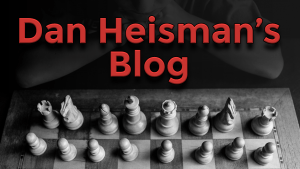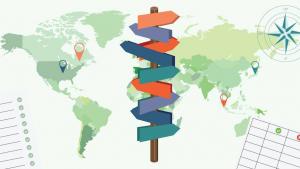Q&A with Coach Heisman Mar 21, 2014
"How can I tell if a chess book is too advanced for me?"
Excellent question. Often you can't! Even books' suggested reading levels (eg by rating) are often misleading, partly because the publisher wants to sell books, not exclude readers who might not benefit.
The ease of understanding advanced texts - and thus thinking they are appropriate for you level - is yet another thing that makes the exclusive use of chess books as an improvement tool so dangerous. If you were taking Russian or Math and you accidentally showed up in a classroom of a more advanced class, you would know it right away. But many advanced chess books use clear English and common chess terms and are perfectly understandable to players below the level of the intended audience. I first wrote about this common happenstance in my column Chess Books and Prerequisites (that's a live link).
Michael de la Maza described the problem well when he wrote (I paraphrase) "I was a frustrated 1400 player who was trying to improve. Then someone mentioned I should read How to Reassess Your Chess (NB: The editions before the current 4th were even more advanced!). So I bought the book and, lo and behold, it was chock full of advice I didn't know. This was it! So I studied the book intently and, in my next game, I took about half an hour trying to set up an endgame where I would have a good knight against a bad bishop. Then I lost my knight!  "
"
Michael was correct. If you don't know how to consistently keep your pieces safe, then learning subtle positional ideas is above your level, even if you know all the terms and concepts in the book you are reading. Sure, if you are a beginner and you don't know en passant from an isolated pawn, then you shouldn't be reading Fischer's My 60 Memorable Games. However, for players above the beginner level, figuring out whether that enticing book on the bookstore shelf (or Amazon recommended list or the one suggested by your friend) is above the level you need can be a daunting - and sometimes expensive - task. If you don't do The Three Show Stoppers well (safety/tactics, time management, activity; take link for more info), then books addressing other issues will probably result in diminishing returns.
"Garry Kasparov wrote that improving your analysis skill is the best way to improve. What do you think?"
I agree with Garry. Analysis is the number 1 chess skill and correlates with your playing strength more than any other single chess factor. By analysis I mean the skill where you examine a position, generate candidate moves, and then deduce/assess opponent replies to see possible lines of play (i.e., generate an analysis tree).
The ability to stop at nodes of the tree and figure out which side is winning, by how much, and why is called evaluation, and I consider that the #2 factor in your chess strength.
By the way, my definition of calculation is the analysis of forcing lines (checks, captures, and threats). Some authors use analysis and calculation synonymously, and some think evaluation is part of analysis, even going so far as to make analysis the entire thought process. That's OK so long as they define their terms.
Besides analysis and evaluation, there are many other common chess areas that are major contributors to your playing strength (but not including personality traits such as perseverance and ability to tolerate and learn from losses, which I cover in my article Traits of a Good Chess Player). These include, but are not limited to:
- Time Management
- Knowledge of Principles, when they apply, and how to prioritize them
- Opening Knowledge
- Endgame Knowledge
- Pattern Recognition (such as common tactics)
Many other skills support analysis, such as board vision, visualization, "chess" deductive logic, concentration, etc.
"Who is the best chess player?"
Since this question is in present tense, I assume it does not imply "...of all time". But ratings are very accurate, so a big rating difference should imply the higher rated player is better. A great up-to-date source for this is Live Chess Ratings (again, this is live link). Currently World Champion Magnus Carlsen has a large rating lead over Lev Aronian, who in turn has a large rating lead over several others vying for 3rd place. This means Aronian is the favorite in the Candidates Matches, currently being held. At the halfway point as I write this, Aronian is tied for the lead with former World Champion Anand.
I want to also note that this week the second edition of Looking for Trouble was released  . This puzzle book contains over 300 problems (up from 230 in the first edition), and in each you have to identify all the threats and then identify the best way(s) to deal with them. All problems are identified by difficulty level with one asterisk (*) the easiest and five asterisks (*****) meaning "get out the computer!"
. This puzzle book contains over 300 problems (up from 230 in the first edition), and in each you have to identify all the threats and then identify the best way(s) to deal with them. All problems are identified by difficulty level with one asterisk (*) the easiest and five asterisks (*****) meaning "get out the computer!" 
Looking for Trouble is not yet available in e-format, but I suspect that after a short while it will become available, likely in in e+chess format for various e-platforms. e+chess is one of those apps which allow electronic chess boards to "come to life". Another is Forward Chess, an app that is used to "live" view another of my books, The World's Most Instructive Amateur Game Book (still can't believe only 1,500 have purchased this book! If I could somehow guarantee your money back that you would learn plenty from it, I would  )
)



